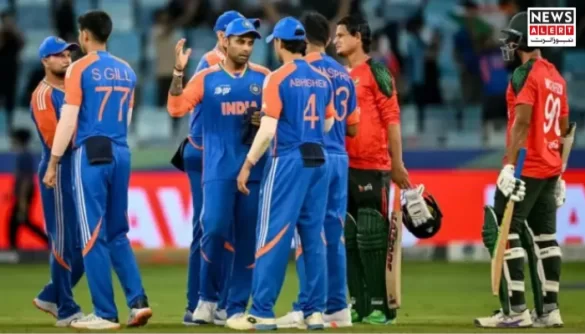ICC Imposes Disciplinary Action
The International Cricket Council (ICC) has issued sanctions against two Pakistani cricketers following a complaint lodged by India. Fast bowler Haris Rauf has been fined 30 percent of his match fee, while opener Sahibzada Farhan was given a verbal warning.
The decision came after both players appeared before ICC match referee Richie Richardson on Friday to address the complaint, which alleged that the pair had engaged in provocative or “aggressive” celebrations during a recent match.
The Controversy
The issue arose after a match between Pakistan and India, where the Indian cricket board reported that Rauf and Farhan’s celebrations were allegedly meant to provoke the opposition. According to the ICC’s code of conduct, any on-field action that is deemed to bring the game into disrepute or could incite hostility may be subject to disciplinary action.
During the hearing, both players defended themselves vigorously. Sahibzada Farhan rejected the allegations, explaining that his celebratory gestures were part of Pathan cultural traditions and carried no intention of targeting India specifically. He emphasized that the celebration was rooted in ethnic tradition rather than national rivalry.
Haris Rauf also defended his actions, explaining that the “six fingers” gesture he made after hitting sixes did not have any political or provocative meaning. When asked by the match referee about the significance of the gesture, Rauf reportedly responded with a question of his own: “You tell me, what does it mean?” Despite his defense, the ICC concluded that his gesture violated the conduct code and imposed a financial penalty.
Reactions from Cricket Circles
The ICC’s decision has sparked debate among cricket analysts and fans alike. Some argue that the sanction was strict but necessary to maintain the spirit of the game. Others feel it may be an overreaction, noting that celebratory gestures are common in cricket and often rooted in personal or cultural expression.
Social media platforms have become a hotbed of discussion, with many Pakistani fans voicing support for Rauf and Farhan. Hashtags in favor of the players trended briefly, with supporters arguing that the ICC’s ruling unfairly penalizes cultural celebrations.
ICC Regulations and Precedents
The ICC’s code of conduct allows referees to penalize players for actions deemed “provocative, offensive, or discriminatory.” Fines can range from a percentage of the match fee to suspension, depending on the severity of the breach. In recent years, there have been similar incidents involving players from multiple countries, including India, England, and Australia, emphasizing the ICC’s strict approach to maintaining discipline on the field.
This case highlights the delicate balance between cultural expression and sportsmanship, particularly in high-stakes matches between rival nations. Cricket commentators suggest that referees are increasingly cautious when it comes to celebrations that could be misinterpreted.
Looking Ahead
Both Haris Rauf and Sahibzada Farhan will remain eligible for upcoming international fixtures, but the ICC’s ruling serves as a reminder of the governing body’s focus on maintaining decorum. Analysts predict that teams will increasingly brief players on the boundaries of acceptable on-field celebrations, especially in matches with intense national rivalry.
The controversy underscores the broader challenge facing international cricket: how to respect cultural expression while upholding the spirit and integrity of the game. While some see the ICC’s action as necessary enforcement, others see it as a cautionary precedent that could affect celebrations in future high-profile matches.














